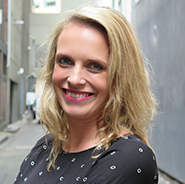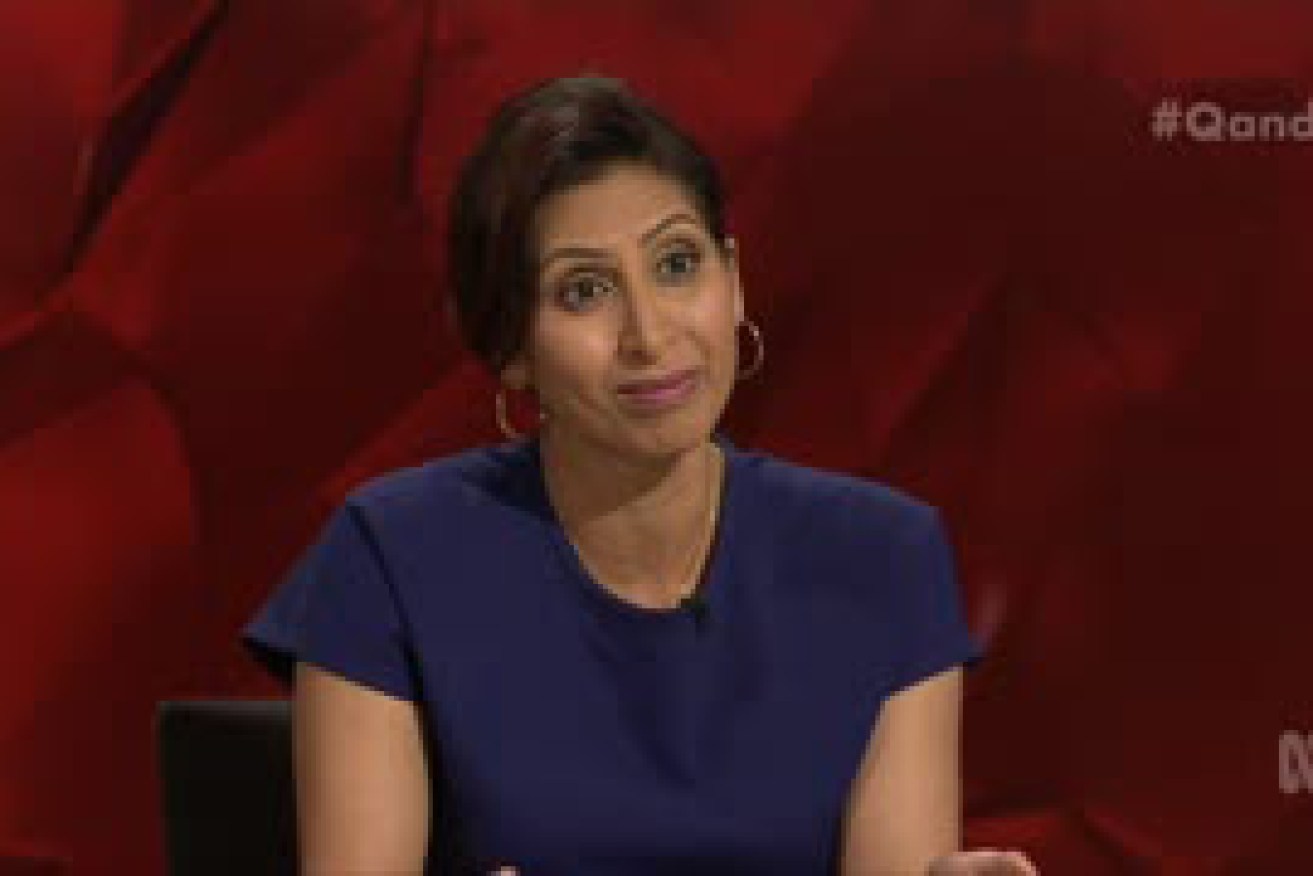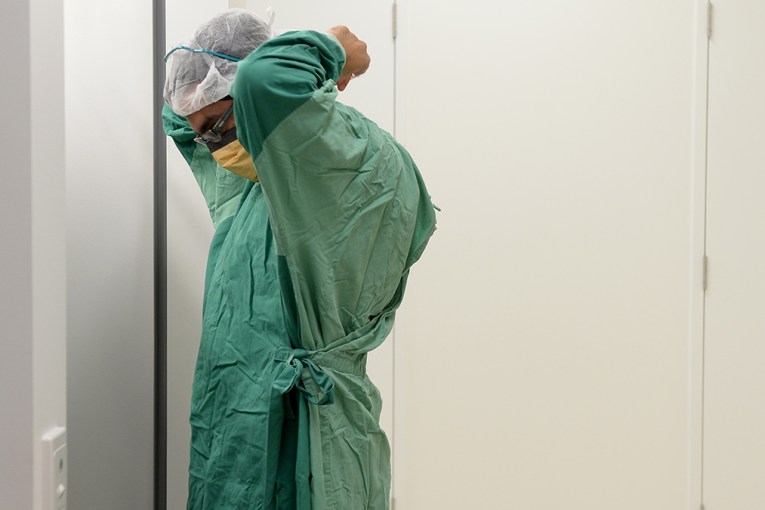Q&A: ‘The signs aren’t zero’ in finding alien life


There could most definitely be other life in the universe, but we won’t be talking to green men and women and sending tweets to the Planet Zarcon anytime soon, panellists on Monday night’s Q&A reasoned.
The ABC program was a politician free-zone this week, and was instead loaded with practical thinkers who spoke about climate change, funding space exploration and racism in sport.
Russian billionaire Yuri Milner and pofessor Stephen Hawking recently announced $100 million in funding towards the search for signs of alien life.
• Q&A: the candidates who could replace Tony Jones
• Q&A: Shorten’s boats backflip a ‘cruel, moral failure’
• Q&A row a bump in the road: Turnbull

Dr Tyson says there is a chance alien life will be discovered. Photo: Twitter
“What were the chances of this being successful and will there be detections of intelligent life from another planet in our lifetime?” an audience member asked.
Renowned US astrophysicist and science communicator Neil deGrasse Tyson – once voted the sexiest astrophysicist in the world – said the chances were “near zero, but not zero”.
“If the likelihood is near zero, to discover intelligence other than that on earth, elsewhere in the universe, that would be the most profound discovery in the history of our species.
“So the very low likelihood of a high return investment, you need to think about it in those terms and I say we go for it.
“By the way, it presumes, that we are intelligent!”
The audience erupted into laughter.
Dr Tyson said without creative investment into science and technology “we will not have a 21st century”.
CSIRO mathematician and marine scientist Beth Fulton said: “It doesn’t matter if it is not intelligent life, if we discover any life, that’s going to tell us a huge amount for the same reason as the maths.
“Life on other planets in the same way, it may not look like us, but it’s the basic principles. ‘Is it carbon based, how does it work?’ We will learn heaps.”
Adam Spencer, broadcaster and self-confessed maths geek, agreed.
“We are unlikely in our lifetimes to start talking to green men and women, but within my lifetime and certainly within yours we will detect life outside of earth,” Mr Spencer said.
“We will detect single cell organisms or really basic amino a acid type. I agree with that.
“We won’t be sending tweets to yellow things off on Planet Zarcon.”
Can science commit itself to fixing Punt Road at peak hour? #qanda
— Daniel James (@MrDTJames) August 3, 2015
Another audience member asked what the panel thought about scientific theories towards climate change becoming “politically partisan” and called on bi-partisan support for firm “scientific theories” to prevent detrimental effects that a theory may suggest could occur.
They referred to the success achieved with the Montreal protocol in combating the growth of the hole in the ozone layer.
“One of the great tragedies of modern society is that you have politicians cherry-picking science in the interest of social, cultural, political, religious belief systems,” Dr Tyson said.
“I don’t have a problem with people believing whatever they want, but if your belief isn’t based on objective truth, you should not create legislation based on it.”
#qanda oh Neil whya you maka da science so sexy huh? — Chris Mosses (@MoeyOhh) August 3, 2015
Good science admits when its wrong. Scientifically literally societies recognise when science is biased by funding. #qanda — Jenny Ejlak (@JennyEjlak) August 3, 2015
The panel was inundated with the big questions about science, maths and medicine, but the ongoing controversy over racism and the constant booing of AFL footballer Adam Goodes was also on the agenda.
Dr Tyson asked: “Why does anyone reference Adam Goodes as a ‘black footballer?
“He’s a footballer.
“When, why and where does skin colour matter in that sport?
“When I think of people talking about race, it is being invoked here in Australia, as far as I can tell, as a mean to figure out who belongs and who does not.
“Yet, as a physicist, when I think about race, I think about it as the human race.”
Neil has a better grasp on Australian racism than most local commentators. #qanda — Daniel James (@MrDTJames) August 3, 2015
Oncologist and Author Ranjana Srivastava spoke of her own experience battling with race in the workplace.
Dr Srivastava said a quarter of Australia’s doctors were immigrant doctors.
“I sit quite nicely at the intersection of both gender and class, and people like me, there are many, many colleagues like me, who have experienced it but you don’t get booed on a ward round,” she said.
“Nobody boos you in a hospital but what does happen quite frequently is subtle put-downs, denigration and it’s really difficult to tease out whether this is because someone is questioning your competence or whether it has to do with racism.
“I have been taken to be everything except a doctor from a tea lady to a coffee lady to I walk around with a 6 foot intern who happens to be Anglo saxon and the patient says ‘I don’t care what she thinks, what do you think?’.
In the #QandA audience tonight: 100% Humans from Earth. Chance of intelligent life somewhere? Pretty good. — ABC Q&A (@QandA) August 3, 2015
No one has answered why would we want to go to Mars ? #qanda — Jason Bryce (@jasonbryce) August 3, 2015
Jazz hands!! #QandA pic.twitter.com/LAXvrCnx4h — Richard Tuffin (@RichardTuffin) August 3, 2015
Nailed it. Passion for science = passion for life @neiltyson #qanda — kerry-ann weirick (@KerryAnnWeirick) August 3, 2015
Jones keeps stumbling over non-Anglo names and laughing it off. It’s not funny, it’s just rude to not learn your guests’ names #qanda — Gerry (@geraldmellor) August 3, 2015
Technology is not inherently good or bad. Its the human who wields it. #qanda
— Noby Leong (@NobyLeong) August 3, 2015
Great #qanda tonight, love to see engaging science talk. Thanks @adambspencer and other panellists.
— Rudi Maxwell (@RudiMaxwell1) August 3, 2015








